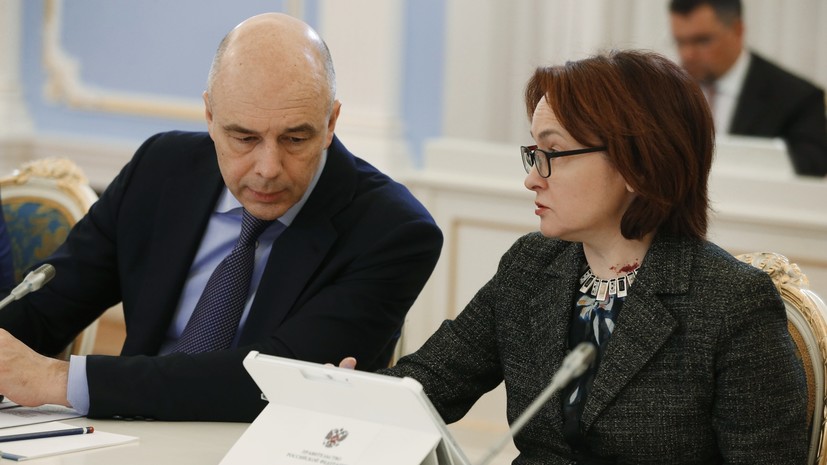The Ministry of Finance of Russia expects to solve problems with inflation in 2022.
This was announced on Friday, January 14, by the head of the department, Anton Siluanov, at the Gaidar Forum.
“We are well aware of the challenges that need to be addressed.
We have adopted a budget, we have good coordination with the Central Bank.
Therefore, those problems, and problems primarily of an inflationary nature, we see now, we believe that this year we will be able to solve them, and we expect positive results by the end of the year,” Siluanov emphasized.
It should be noted that in 2021 inflation in Russia increased from 4.9% to 8.4%.
The indicator was the highest in the last six years and more than doubled the target level of the Central Bank (4%).
At the same time, in early January 2022, the growth rate of consumer prices in the country accelerated to 8.6%.
This is evidenced by the materials of Rosstat and the Ministry of Economic Development.
As RT, managing partner of EY Alexander Ivlev, told RT on the sidelines of the Gaidar Forum, a number of factors do not yet allow to contain the observed increase in prices for goods and services in Russia.
Nevertheless, the country has the opportunity to slow down inflation this year, the specialist is sure.
Alexander Ivlev - about the situation with inflation in Russia
The reasons for the noticeable increase in inflation in Russia were both external and internal factors, says Georgy Ostapkovich, director of the Center for Market Research at the Institute for Statistical Research and Economics of Knowledge at the National Research University Higher School of Economics.
According to him, about 40% of the current rise in the cost of goods in the country was caused by a global increase in prices in connection with the pandemic.
“In the context of the spread of coronavirus, governments of many countries have begun to actively help people and businesses.
This support was provided by turning on the printing press.
A huge amount of unsecured money was printed, which is why, in the end, manufacturers began to raise prices for almost all goods: food, building materials, metals and everything else, ”explained the interlocutor of RT.
As the specialist noted, in Russia the cost of goods was also affected by overpricing by large retail chains.
In addition, disruptions in global supply chains, weak fruit and vegetable harvests, and rising labor costs in a number of industries have taken their toll as migrant workers leave.
To combat inflation in 2021, the Central Bank began to tighten monetary policy.
From March to December, the regulator raised the key rate seven times and raised it from 4.25 to 8.5% per annum.
Moreover, earlier the Central Bank did not rule out the possibility of additional increases in 2022.
It is assumed that in this way the Bank of Russia will be able to cool consumer demand and contain further price increases.
“Due to the increase in the key rate, money traditionally becomes more expensive - that is, interest on loans and deposits begins to grow.
As a result, the demand for goods and services decreases, so manufacturers are forced to reduce or at least not raise too sharply the prices of their products.
All this leads to a slowdown in inflation, ”Pavel Sigal, First Vice President of the all-Russian public organization of small and medium-sized businesses Support of Russia, explained in a conversation with RT.
In turn, the chairman of the Central Bank, Elvira Nabiullina, said that if the regulator had not raised the interest rate, inflation in Russia could have exceeded 12%.
“If we didn’t do that tightening of policy… if we left the rate as it is, of course, inflation would be higher by about four percentage points.
We would have had to raise rates even more, and inflationary expectations would have warmed up, ”Nabiullina noted.
Also on russian.rt.com Recovery phase: what happened to the Russian economy in 2021
Government measures have also helped to partially slow down inflation in Russia.
This was stated by the Minister of Economic Development Maxim Reshetnikov during his speech at the forum.
“The government is taking a fairly wide range of actions related to quotas, export and import duties, dampers, subsidies, and so on, in order to reduce this pressure, especially on food markets.
And we understand that these measures generally work.
According to various estimates, we dampened inflation by 0.6-0.7 percentage points thanks to all these measures,” the minister stressed.
According to the forecast of the Central Bank, by the end of 2022, inflation in Russia will slow down to 4-4.5%.
According to Georgy Ostapkovich, before the end of winter, the growth rate of consumer prices in the country may still increase slightly, but in the spring they will reach a plateau.
At the same time, by mid-autumn, the inflation rate may drop to 5%, the economist suggests.
“In addition to raising the key rate, we need to somehow negotiate with retail chains.
This has already given the first effect - retailers have proposed limiting the markup on consumer goods to 10%.
Subsidies to agricultural producers are needed, as well as the introduction of export duties if the price on the external market significantly exceeds the cost on the domestic one.
There are a lot of mechanisms for slowing down inflation, you just need to apply them correctly,” Ostapkovich concluded.

